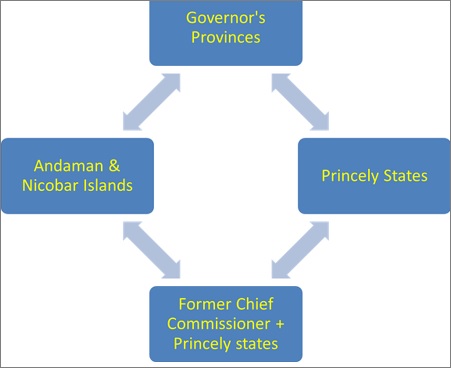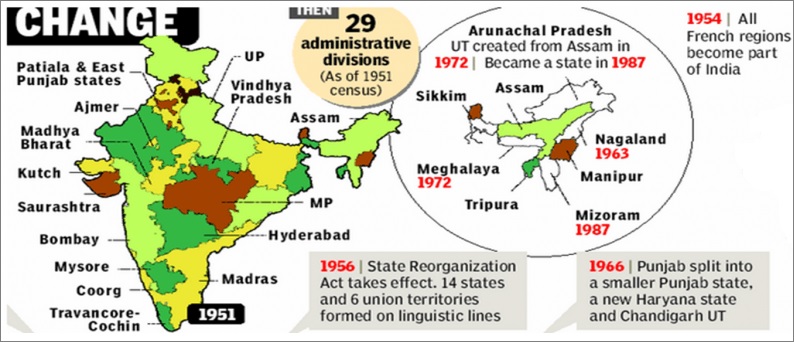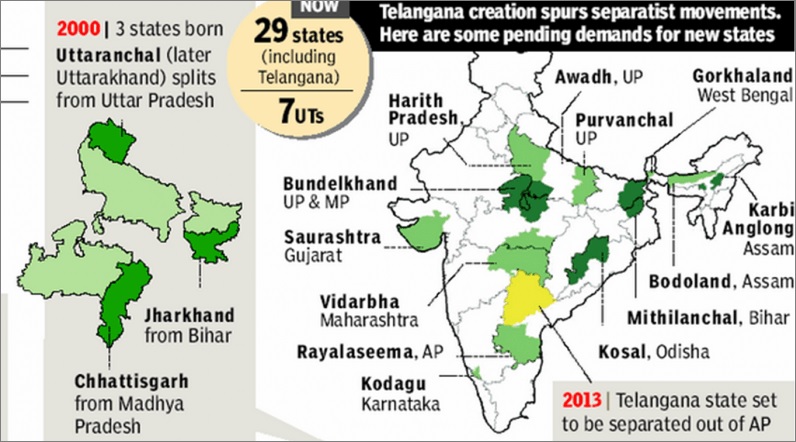Linguistic Reorganization of States
by Devender
0 2293
Congress in 1917 showed their interest to create linguistic provinces in a Free India and after the Nagpur session in 1920, this principle was extended and formalized with the creation of provincial Congress Committee by linguistic zones. It further got the support of Mahatma Gandhi.
Linguistic Reorganization of States
- First Linguistic Province commission (LPC):
- In 1948, the constituent assembly appointed the Linguistic Provinces Commission
- It was headed by Justice SK Dhar
- Its aim was to determine the desirability of linguistic provinces
- The commission also stood against this idea at that time because it would threaten national unity and it would become a challenge to administer
- The commission favored reorganization on the basis of administrative convenience rather than on a Linguistic basis
- Second Linguistic Province commission (LPC):
- The movement for separate Andhra became violent
- Finally, in 1952, Nehru announced the formation of a separate state, and the State of Andhra Pradesh came into existence
- States Reorganization Commission 1953:
- Nehru appointed the Reorganisation Commission with Justice Fazl Ali, KM Panikkar & H Kunzru as members
- Its main aim was to examine the entire question of the reorganization of the states of the Union
- States Reorganization Act:
- Bombay reorganization act, 1960: Formation of Gujrat
- State of Nagaland act, 1962: Nagaland as a separated state from Assam
- Punjab reorganization act, 1966: Formation of Haryana, New state of Himachal Pradesh act, 1970
- Northeastern reorganization act, 1971: Formation of Manipur, Tripura, Meghalaya, Mizoram & Union territories of Arunachal Pradesh & Mizoram
- New state of Sikkim act, 1975
- State of Arunachal Pradesh Act, State of Mizoram act 1986: Formation of States of Mizoram & Ar. Pradesh
- State of Goa Act, 1987
- P reorganization act, 2000: Formation of Chhattisgarh
- P reorganization act, 2000: Formation of Uttarakhand
- Bihar reorganization act, 2000: Formation of Jharkhand
- Andhra Pradesh reorganization act, 2014: Formation of Telangana
The partition was very bitter and PM Jawaharlal Nehru was totally against the idea of dividing the country any further on the basis of language but regional congress communities were demanding it.
A second LPC was formed in December 1948 to verify the reports provided by Dhar and look into this matter again but they also stood by the same report and had nothing new to add to it. The members of this commission were J.L. Nehru, Vallabh Bhai Patel & Pattabhi sitaramayya.

Formation of First linguistic State
After the independence of India, Telugu speakers asked Congress to stick to their old resolution in favor of linguistic states. They started petitions, representations, street marches, parts to advance their cause, and a popular freedom fighter, Potti Sriramulu undertook a fast unto death over the demand for a separate Andhra. After 58 days, he died which agitated people, and riots, demonstrations, hartals, and violence started all over Andhra.
The formation of Andhra Pradesh also brought struggle all over India, the struggle for making other states on linguistic lines.
This commission recommended the abolition of 4 fold classification of states and the creation of 16 states & 3 centrally administered territories.
It came out in 1956 and provided for fourteen states and six centrally administered territories whereas opposed the splitting of Bombay & Punjab.
Formation of States till 2014
An opening was made to make more states according to the needs but only after the decision of the parliament which led to the formation of a number of Indian states:

There are still many demands for the creation of new states and after the formation of Telangana, these demands have increased. These demands are still long pending and on different bases like ethnicity, lack of development, administrative inconvenience.


Share:







Comments
Waiting for your comments